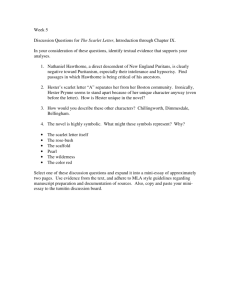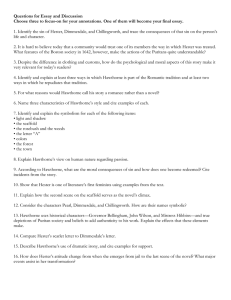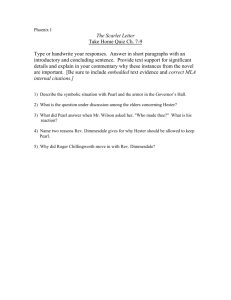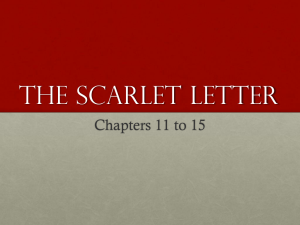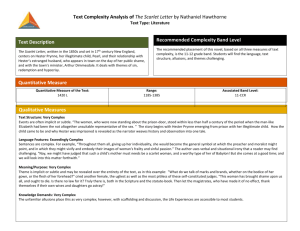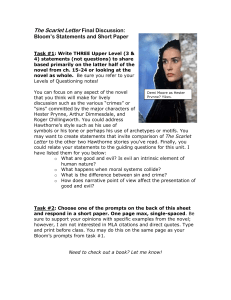Focused Discussion Questions - Chapters 11-15
advertisement
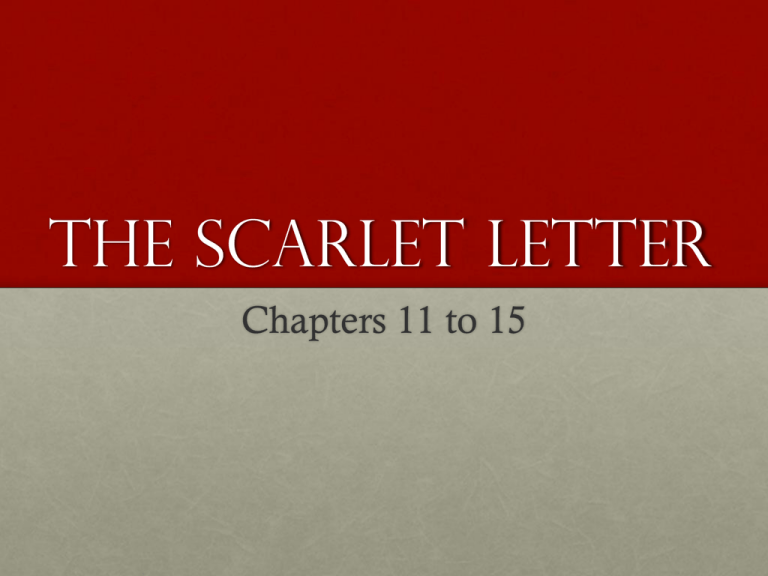
The Scarlet Letter Chapters 11 to 15 Warm UP: (for Everyone) Cite specific quotes or passages when answering the following questions: • What did you find most compelling in these chapters? • What did you find most frustrating (beyond Hawthorne’s verbosity)? • What did you find most confusing? How could that confusion be resolved? (Did a group mate explain? Did you experience an aha moment during discussion? Are you still confused?) 1. “The Interior of a HEart” • Basic: How do the townspeople feel about Dimmesdale? Why? • Higher Level: Cite specific text that demonstrates the irony of the townspeople’s perceptions of him. • Highest Level: What themes relating to sin, guilt and confession does Hawthorne seem to be developing? 2. “The minister’s vigil” • Basic: Recall the descriptions of all that occurs on the scaffold in this chapter. • Higher Level: Identify imagery and/or symbolism that reinforces the significance of these events. • Highest Level: What message is Hawthorne sending about a person’s public self verses his private self ? Cite specific text to support your answer. 3. “Another view of Hester” “It is to the credit of human nature, that, except where its selfishness is brought into play, it loves more readily than it hates. Hatred, by a gradual and quiet process, will even be transformed to love, unless the change be impeded by a continually new irritation of the original feeling of hostility” (Hawthorne 155) • Do you agree or disagree with this statement? Why? • How does it apply to the novel specifically? Who is continuously experiencing irritation? Who has moved past it? What is the difference between these two characters? 4. “Another view of Hester” • Basic: How has Hester Prynne changed, both physically and psychologically, over the course of the past seven years? • Higher Level: Is Hester’s transformation a realistic one? Why or why not? • Highest Level: What is the thematic purpose of Hawthorne’s descriptions of these changes? 5. “Hester and the Physician” • Basic: How have Chillingworth’s physical and psychological changes been expanded? What does he owe these changes to? • Highest Level: Consider Chillingworth’s changes in juxtaposition to those of Hester. What message is Hawthorne creating about sin and redemption? What imagery is used to create these messages? 6. “Hester and Pearl” • Basic: How has Pearl’s character changed in the four years since the reader encountered her at the governor’s hall? • Higher Level: What symbols and plot points are used to convey these changes? • Highest Level: If Pearl is supposed to serve as a foil to Hester’s character, what is Hawthorne indirectly saying about Hester? “Predicting and Revisiting” (for Everyone) Now that all of the novel’s major players have been revealed for who they are: • Make a logical prediction about where they are going to end up at the novel’s conclusion. • Reread chapter 3, starting at “While this passed” (69) and identify the symbolism and foreshadowing that is evident.
